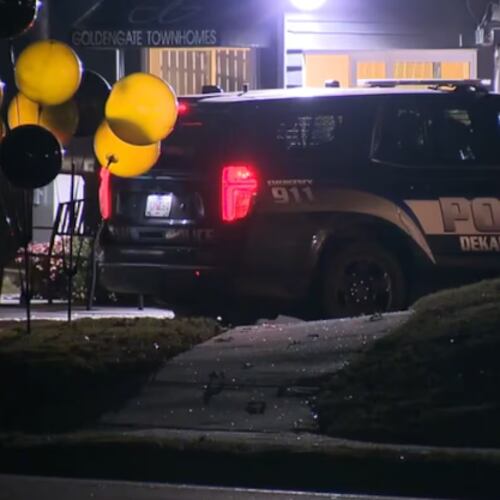A request from a resident to put up a Nativity scene at city hall set off a month-long debate in a metro Atlanta community over the government’s role in regulating religious symbols in public spaces.
The conversation among neighbors and officials in Dunwoody has exposed the difficulty governments face during the holidays: respecting the legal separation of church and state, while offering inclusive decorations.
Earlier this fall, a resident emailed the city and asked if he could donate a Nativity scene to be displayed at City Hall, depicting the birth of Jesus. City staff then drafted a policy that defined and regulated “holiday displays” on city grounds. Over the course of three City Council meetings, elected officials debated the issue, at one point mulling over a list of what is a “religious symbol.”
“I’m so frustrated because I don’t think we needed a policy to follow the law. … A healthy dose of common sense would have forestalled what we’ve gone through,” Councilwoman and Mayor-elect Lynn Deutsch said near the end of a five-hour council meeting Monday.
Credit: Pascal Deloche / Corbis Documentary / Getty Images
Credit: Pascal Deloche / Corbis Documentary / Getty Images
The council ultimately decided to pass a policy that any decorations with religious symbols would not be appropriate, scrapping the list of acceptable and unacceptable items. The guidelines leave it up to the city manager and staff to decide what can be displayed. The city said it is still working on its holiday decorations for this year, and doesn’t plan to put up a Nativity scene unless it is part of a larger display celebrating religious diversity.
“It’s a very difficult subject and it can be a very divisive subject with our citizens,” Mayor Denis Shortal said during an Oct. 28 meeting.
The U.S. Supreme Court has ruled a government cannot take a position that endorses or promotes a religion. Governments are generally allowed to celebrate the holiday season with secular decorations, including trees, lights and depictions of Santa Claus. Things get more complicated when discussing more implicitly religious symbols, such as a Nativity scene or menorah.
The Supreme Court has ruled differently on several hotly contested cases revolving around Nativity scenes, and has stressed that decisions can be made on a case-by-case basis.
“This seems to be a classic example of cities not really knowing what to do in light of the Supreme Court decisions. And that conclusion is pretty understandable,” said Lynne Rambo, a First Amendment expert who grew up in Dunwoody and worked in Atlanta for many years. She now teaches law at Texas A&M University.
The controversy surrounding religion in government has percolated throughout Georgia courtrooms, parks and sports fields over the past several decades.
Credit: Jonathan Phillips / Special / AJC File
Credit: Jonathan Phillips / Special / AJC File
This summer, the U.S. Supreme Court ruled that a 40-foot cross erected on a war memorial on public land in Maryland could stand. Georgia officials said that decision would help preserve two similar displays in the state: A 12-foot cross in Fort Oglethorpe dedicated to a Civil War messenger killed in battle and a stone cross honoring World War I veterans along a busy street in Augusta.
Located in north DeKalb County just outside the Perimeter, Dunwoody is known for having a vibrant faith community among its nearly 50,000 residents, and is home to a number of churches and synagogues.
During the recent council meetings, the list of acceptable decorations sparked much of the discussion, while council members reiterated that they want to be inclusive.
“The entire context of a government display very much determines whether the display is constitutional or not,” said Caroline Mala Corbin, a law professor at the University of Miami. She added that “even in the minds of the Supreme Court, these calls are not clear-cut.”
Mayor-elect Deutsch pointed out that several religions have symbols similar to menorahs, which can be religious in some contexts and secular in others. She added in an interview that the initial guidelines and list presented to the City Council came off as “exclusionary” and were not well thought out.
“I think that the policy was an overreaction to one email,” she said.
Credit: Hyosub Shin
Credit: Hyosub Shin
But there was also some value in the discussion, Deutsch said. While debating the issue, council members convened a group of faith leaders in Dunwoody, which now plans to meet several times throughout the year.
“I applaud their effort to try to figure out what might be perceived as endorsing religion,” Rambo said, “even if it might have been more cautious than necessary.”
Assistant City Attorney Bill Riley wrote a memo to the council that explained the background of the issue. But 12 paragraphs of legal background in Riley's note — which was separate from the policy itself — were taken verbatim from a legal briefing originally written by a lawyer at the Freedom From Religion Foundation. According to its website, the national group promotes nontheism and advocates for the separation of religion and government.
Riley’s memo did not cite where he got the information he presented to the council.
That caused concerns from some residents who disapproved of the city taking a stance on the religious symbols issue.
Credit: Christopher Oquendo
Credit: Christopher Oquendo
“If you’re going to basically copy and paste, you ought to at least say where it came from,” said Debbie Montgomery, who lives in Dunwoody and believes a Nativity scene should be allowed at City Hall. “You want people of different faiths to be included. I think ruling out the Nativity scene certainly isn’t the way to do it.”
Though a city spokeswoman, Riley declined to be interviewed. When asked about Riley’s memo, the city issued a statement from Shortal: “After receiving input and considering it carefully, the Council approved a policy that we believe is legal and inclusive.”
During a meeting last month, the outgoing mayor said the discussion signaled a changing society.
“Sometimes, I think we over-legislate the world a little bit, but I understand the pros and cons,” Shortal said. “I guess it’s the way things are today.”
Wouldn’t you like to support our strong journalism? Your subscription helps us cover your communities in a way that no one else can. Visit https://subscribe.ajc.com/hyperlocal or call 404-526-7988 to begin or renew your subscription.
About the Author
Keep Reading
The Latest
Featured








